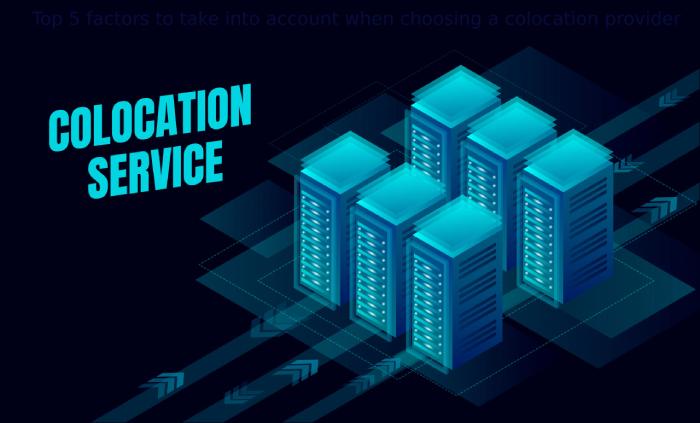Top 5 factors to take into account when choosing a colocation provider

Top 5 factors to take into account when choosing a colocation provider
Businesses in the modern digital era rely largely on technology to run and remain competitive. The data center is one of a company’s most important technological infrastructure components. While some companies keep a data center on-site, others choose colocation provider. A company hires space and resources from a different data center operator in practice, known as colocation. Businesses gain from this, including increased security, dependability, scalability, and cost efficiency. However, not all providers are made equal. Therefore it’s important to choose one carefully by considering several variables. The main factors to think about when choosing a colocation provider will be covered in this post.
Table of Contents
1. Location
Location is one of the most important aspects to consider when choosing a supplier. Businesses should pick a provider with a data center close to their main location or target audience. The smaller the latency and the faster the data transfer, the closer the data center is. To ensure company continuity during a disaster, choosing a provider with a data center in a region with a low risk of earthquakes or hurricanes is essential.
2. Connectivity
When choosing colocation services, connectivity is still another important issue to consider. Companies want to pick a service provider with a strong and dependable network architecture that offers high-speed connectivity to the Internet and other networks. Additionally, to ensure redundancy and lower the chance of outage, the provider should provide a variety of carriers and routing alternatives.
3. Security
When it comes to data centers, security is crucial. Businesses should choose a provider who takes security seriously and who has put in place a wide range of security controls, including physical security, access controls, and environmental controls. The supplier should additionally provide round-the-clock security monitoring and surveillance to identify and stop potential security breaches.
4. Scalability
Another important aspect to take into account when choosing a service is scalability. Businesses should choose a provider that allows them to scale up or down their resources in response to changing needs. For organizations to scale up or down as needed, the service provider should offer various amounts of bandwidth, power, and storage. The supplier must also be able to accommodate future growth and expansion so that the company can scale its operations without moving.
5.SLAs (Service Level Agreements)
When choosing, Service Level Agreements (SLAs) are crucial. SLAs outline the service level that the supplier and the repercussions will provide if they don’t fulfill their commitments. Businesses should carefully examine the SLAs provided by prospective providers to ensure they offer sufficient security for the company’s vital processes. Businesses should also check the provider’s track record for upholding SLAs and their capacity to respond swiftly during a service disruption.
6. Cost
When choosing a colocation provider, price is an important factor. Businesses should examine the prices of various providers and consider the total cost of ownership, including the initial investment and ongoing operating costs. Businesses should also consider the supplier’s pricing structure, such as per rack, square foot, or kilowatt, and choose the one that best suits their requirements.
A business’s chosen supplier may dramatically impact its operations and performance. Businesses should carefully evaluate several criteria when choosing a provider, including as location, connection, security, scalability, service level agreements, and cost. Businesses can choose a supplier that best suits their needs and offers a safe, dependable, and affordable solution for their data center needs by carefully assessing these elements.
Also read:- Top Reasons To Switch To Colocation In 2023




